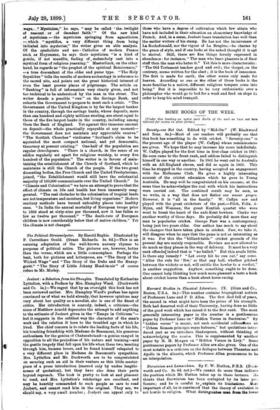Joubert a Selection from his Thoughts. Translated by Katharine Lyttelton,
with a Preface by Mrs. Humphry Ward. (Duckworth and Co. 5s.)—We regret that by an oversight this book has not been reviewed earlier. Mrs. Humphry Ward's preface has again convinced us of what we held already, that however opinions may vary about her quality as a novelist. she is one of the finest of critics. Her introduction is scarcely, indeed, a criticism—the niece of Matthew Arnold deprecates the attempt to add anything to the estimate of Joubert given in the " Essays in Criticism"— but it suggests in the subtlest way the character of the man's work and the relation it bore to the troubled age in which he lived. Her chief concern is to relate the leading facts of his life, his touching friendship with Madame de Beaumont, his generous enthusiasm for the genius of Chateanbriand—a genius ranged in opposition to all the prejudices of his nature and training—and the gentle tragedy that fell upon his life when these two, 'meeting through him, became lovers, and he found himself relegated to a very different place in Madame de Beaumont's sympathies. Mrs. Lyttelton and Mr. Duckworth are to be congratulated on securing such an aid in their venture as this little master- piece of a prose introduction (marred only by undue lengthi- neases of quotation), but they have also done their parte beyond reproach. The book is pretty to look at and pleasant to read, and Mrs. Lyttelton's renderings are excellent, and may be heartily commended to such people as care to read Joubert, ..and cannot read him in the original. They are, we should say, a very small number ; Joubert can appeal only to those who have a degree of cultivation which few attain who have not included in their education an elementary knowledge of French. And, in a sense, Joubert bears translation less well than the earlier writers of his stamp. He has not the incisiveness of La Rochefoucald, nor the vigour of La Bruyere,—he charms by the grace of style, and if one looks at the naked thought it is apt to shrivel. Still, there are fine things tersely expressed in abundance : for instance, " The man who fears pleasure is of finer stuff than the man who hates it." Yet this is more characteristic : " The Old Testament teaches good and evil ; the Gospel, on the contrary, seems written for the elect ; it is the book of innocence. The first is made for earth, the other seems only made for heaven. According as one or the other of these books is the more familiar to a nation, different religious tempers come into being." But it is impossible to be very enthusiastic over a philosopher who would go to bed for a week and feed on slops it order to keep his mind tranquil.


































 Previous page
Previous page